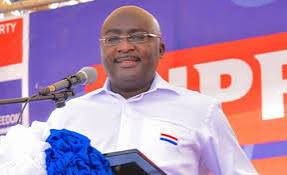Bawumia Condemns Tribal and Religious Campaigns in NPP Flagbearer Race: Why This Hits Home for Me
A few years ago, I sat in a trotro in Accra, eavesdropping on a heated debate between two passengers. One was loudly insisting that only a person from a certain tribe could lead Ghana “properly,†while the other quietly disagreed, trying not to escalate things. I remember feeling so uncomfortable. Not because of the shouting (let’s be real, that’s normal in trotros), but because of how easily people could write off someone’s capability just based on where they’re from—or what they believe.
So when I saw headlines recently about Dr. Mahamudu Bawumia condemning tribal and religious campaigning in the New Patriotic Party (NPP) flagbearer race, I couldn’t help but feel… relieved. And, honestly, kind of hopeful.
In case you missed it, Bawumia—who’s currently the Vice President and one of the front-runners in the NPP’s upcoming flagbearer contest—came out strongly against the use of tribal and religious identity as political strategies. He basically said: “Let’s not reduce this to who comes from where or who worships what.†And I’m like… thank you. Finally, someone said it out loud.
Because let’s face it—Ghana’s politics can get messy. It’s no secret that tribal and religious sentiments have been used as subtle (and sometimes not-so-subtle) tools to sway votes. I've seen it on WhatsApp broadcasts, overheard it in chop bars, and read between the lines of campaign speeches. Sometimes it’s coded; other times it’s shamelessly loud. Either way, it’s divisive. And dangerous.
Now, I’m not saying identity doesn’t matter. Of course it does. Our backgrounds shape who we are. But using them as weapons in a political race? That’s a different ballgame. It turns elections into battles of “us vs. them,†instead of debates about vision, integrity, and solutions. And in the long run, it hurts all of us.
To hear Bawumia, a Muslim from the north, say he wants to be judged on merit—not religion or tribe—says a lot. It challenges the narrative that certain people are automatically more “electable†just because they check the right identity boxes. And honestly, in a country as diverse as ours, shouldn’t that be the bare minimum?
I might be wrong, but I feel like a lot of us—especially young people—are tired of this old script. We want leaders who can fix dumsor, create jobs, and make the cedi behave. We want ideas, not ethnic divisions. We want competence, not clergy endorsements.
Still, it’s not just up to politicians to change the narrative. It’s up to us too. What we repost, what we laugh at, what we tolerate in our conversations—it all adds up. We can’t condemn tribal politics in public and then go home and say “but you know northerners/krobos/akans always do…†(Yeah, I’ve heard all those lines before. You probably have too.)
Bawumia’s statement might just be words, sure. But words matter. They plant seeds. They challenge thinking. They start conversations like this one.
So here’s my question: if more political leaders took the bold step to rise above identity politics, would we support them? Or would we secretly still vote with our tribe?
Something to chew on next time you’re scrolling past political debates on social media or listening to the radio on your way to work.



No comments yet
Be the first to share your thoughts!